Free job rejection letter samples are provided here on this page for your use. If you are in a position where you have to write a job rejection letter quite often, you can use the job rejection letter templates given here in Microsoft Word and PDF formats. So, make sure to scroll down and also check out other important details related to a job rejection letter.
What is a Job Rejection Letter?
A job rejection letter is a letter that is written and sent by the employer to a job applicant to inform them about their rejection of the job position for which they had applied. Whenever a candidate’s job application is rejected, he/she must be notified or informed of such rejection at the earliest. Writing a rejection letter makes this notification official.
A job rejection letter usually includes reasons for the rejection such as overqualification or under qualification of the applicant, or lack of work experience, etc. Whatever the reason might be, the employer should clearly mention such a reason in this letter. This type of letter may also include suggestions for the candidate for their improvement or encouragement to apply for positions in the future.
The letter should also appreciate the candidate for their valuable time and effort to apply for the position. It is because there are chances that you may hire a candidate for another position in the future whom you are rejecting now for the time being. So, it is important that a job rejection letter must be written in a professional manner and with the viewpoint of maintaining a positive relationship with the candidate.
Job Rejection Letter Format Example
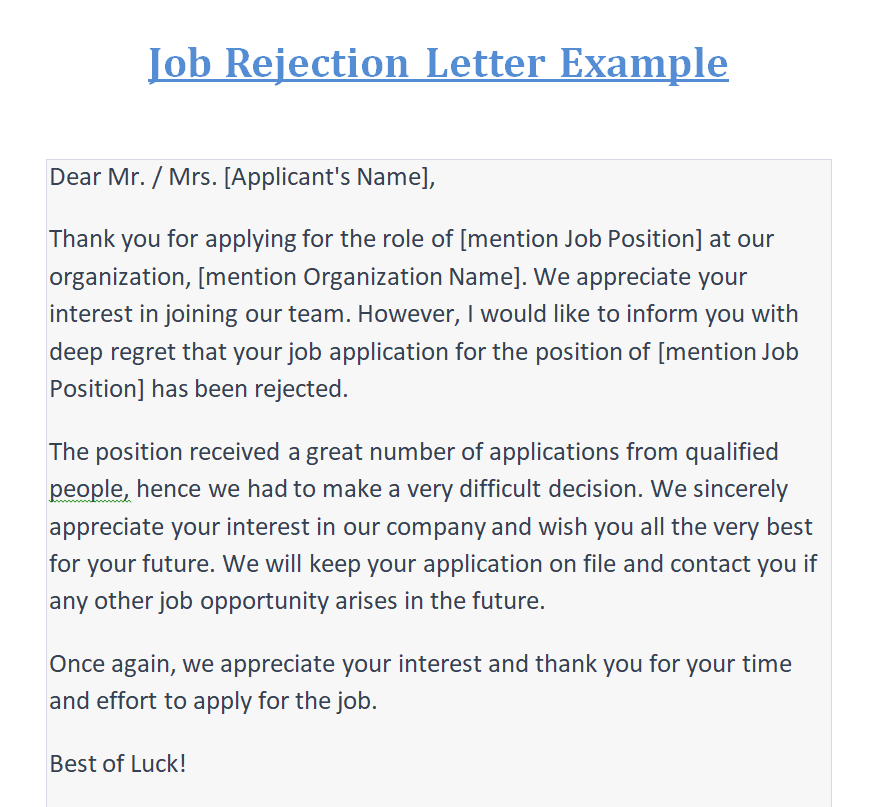
Job Rejection Letter Sample
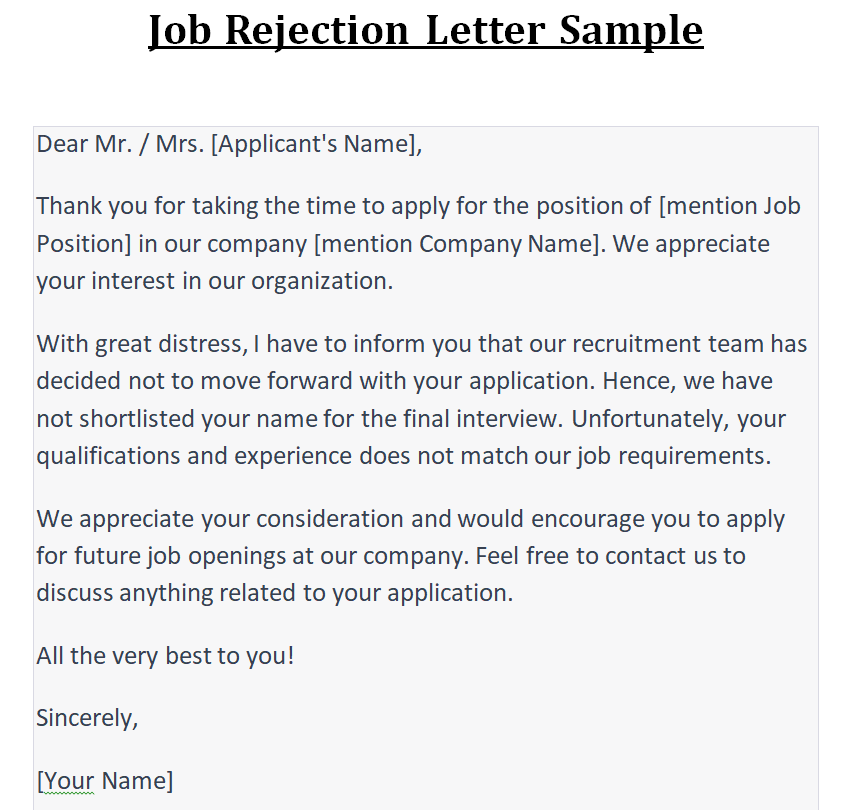
Soft Job Rejection Letter Template
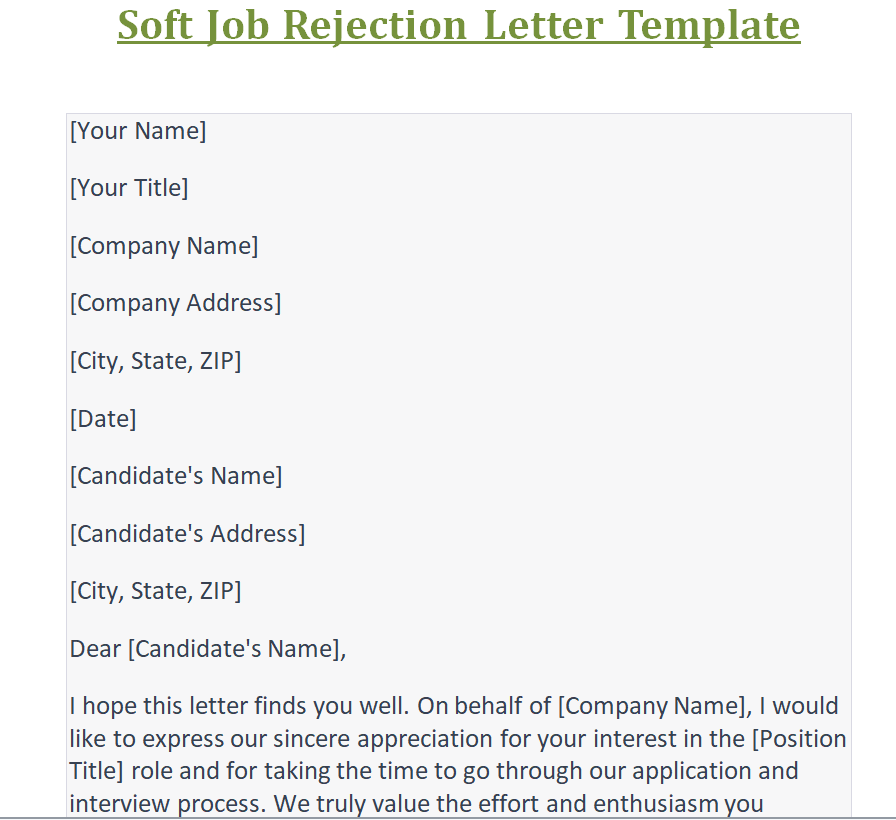
Importance of Writing a Job Rejection Letter
As an HR Manager, you must recognize the utmost importance of writing a job rejection letter. While it may seem like a routine task, this seemingly simple act holds significant value for both the company and the candidates involved. By crafting a well-written and thoughtful rejection letter, you actually demonstrate professionalism, empathy, and respect, fostering a positive reputation for the organization. First and foremost, a job rejection letter serves as a formal closure to the recruitment process. It acknowledges the time and effort candidates have invested in applying and interviewing for the position.
By providing clear and concise feedback, you can offer them a sense of closure, enabling them to move forward with their job search confidently. Furthermore, a rejection letter demonstrates the company’s commitment to transparency and fairness. Candidates often invest considerable effort in the application process, preparing resumes, researching the organization, and attending interviews. By providing constructive feedback, you don’t only display appreciation for their interest but also help them identify areas for improvement in their future endeavors. This approach builds goodwill and enhances the company’s reputation, both internally and externally. The rejection letter also presents an opportunity to build relationships with candidates who may be suitable for future positions. By expressing sincere appreciation for their skills, qualifications, and dedication, you can leave the door open for potential future collaboration.
Candidates who receive a thoughtful rejection letter may remember the positive experience and consider applying for future job openings within the organization. Moreover, a rejection letter demonstrates the company’s commitment to professionalism and empathy. Candidates invest not only their time but also their hopes and aspirations in the application process. By delivering a personalized and empathetic message, you can acknowledge their efforts and treat them with the respect they deserve. This approach contributes to a positive candidate experience, which is crucial for attracting and retaining top talent. Lastly, a well-written rejection letter showcases the organization’s attention to detail and strong communication skills.
By crafting a letter that is clear, concise, and free from errors, you can emphasize your commitment to professionalism and excellence. Such attention to detail in the rejection process can leave a lasting impression on candidates, reflecting positively on the organization’s overall brand. In conclusion, writing a job rejection letter is not just an administrative task; it is an opportunity to showcase the organization’s values, professionalism, and empathy. By providing closure, constructive feedback, and maintaining positive relationships, you can actually contribute to the candidate’s experience, enhance the company’s reputation and foster future collaborations.
Professional Job Rejection Letter Template

Official Job Rejection Letter Format
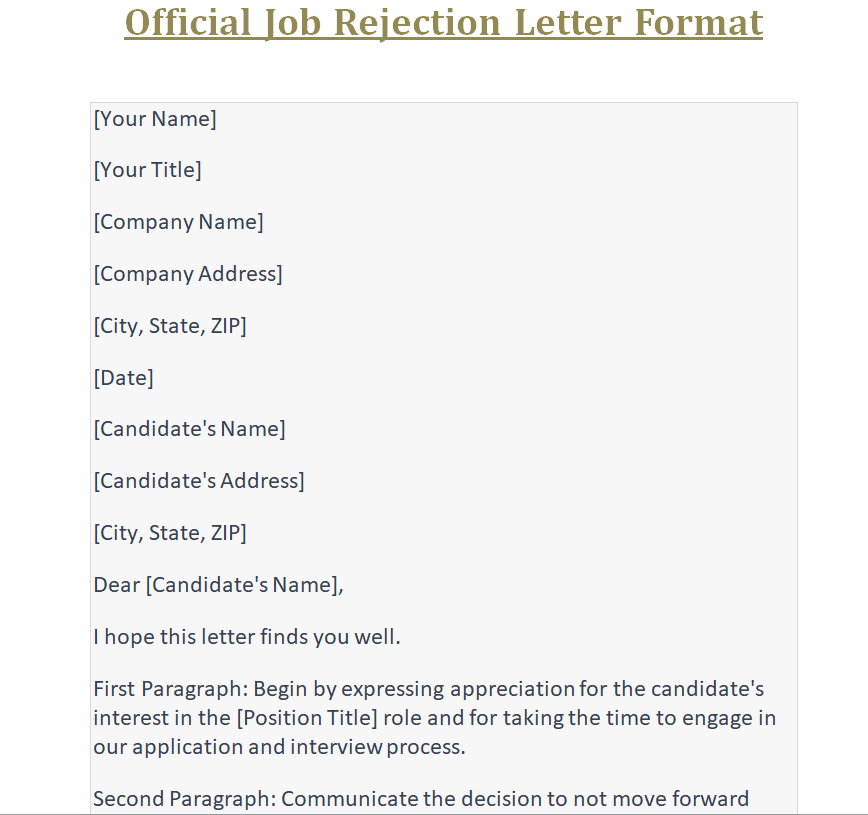
Polite Job Rejection Letter Sample
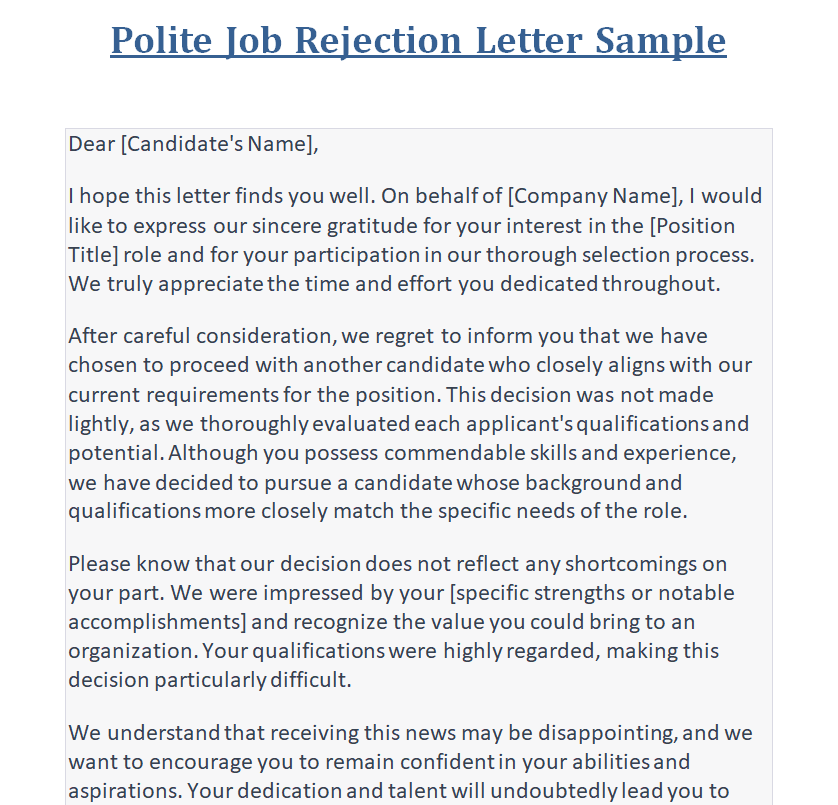
How to Write a Kind Job Rejection Letter – Basic Tips
Using a free job rejection letter sample can save a lot of your time and effort. With the help of a pre-formatted sample, all you have to do is to edit the details of the sample, save it, and send it to the candidate. However, if you want to write a job rejection letter yourself, make sure to consider the following simple yet effective tips:
- Make sure to keep the letter brief and direct. Try to be straightforward but not rude in your writing. It should clearly state the employer’s decision of not hiring the applicant.
- Make sure to write the job rejection letter in a courteous and professional manner.
- Avoid any kind of criticism and try to use positive language throughout writing the letter.
- Briefly state the reason or reasons why the applicant was not selected for the job. Such feedback will surely help the applicant to improve himself to apply for any upcoming job openings.
- Acknowledge and appreciate the applicants for the time and effort that they put into the application process.
- Add a statement to encourage the applicant that he/she will surely be considered for any job opening in the future.
- The timing of the letter is very important. The employer should try to write the job rejection letter as soon as the decision of not hiring a particular applicant is made.
- The sender must include his/her contact details in the letter so that the applicants can easily communicate with him/her for any queries or details in the future.
- The letter must be proofread for any mistakes or omissions.
How to Write a Soft Rejection?
As an HR Manager, you will have to understand the significance of delivering a soft job rejection in a thoughtful and empathetic manner. When writing such a letter, you will have to employ various strategies to ensure the candidate feels respected and valued despite not being selected for the position. When writing a soft job rejection, here are some key points to consider:
- Express appreciation for the candidate’s interest and effort.
- Personalize the message by addressing the candidate by name and mentioning their specific qualifications.
- Highlight their strengths and positive attributes.
- Provide constructive feedback for their professional growth.
- Use tactful language to soften the blow and maintain their self-confidence.
- Encourage and express optimism for their future endeavors.
- Mention the possibility of considering them for future opportunities.
- Provide contact information for further communication.
By following these concise guidelines, we ensure a respectful and empathetic approach to delivering a soft job rejection.